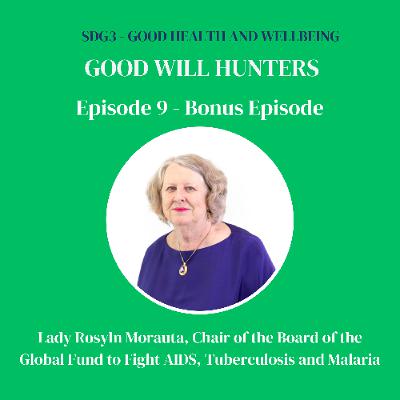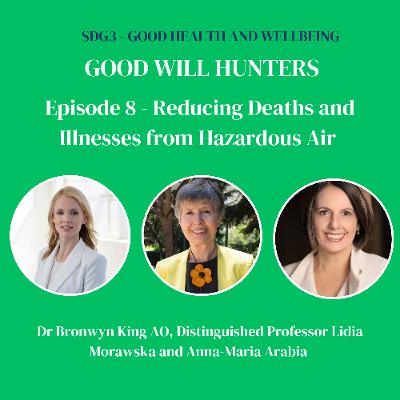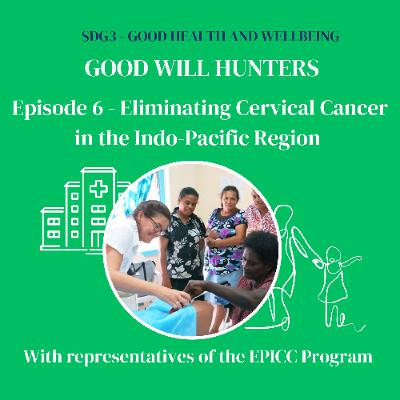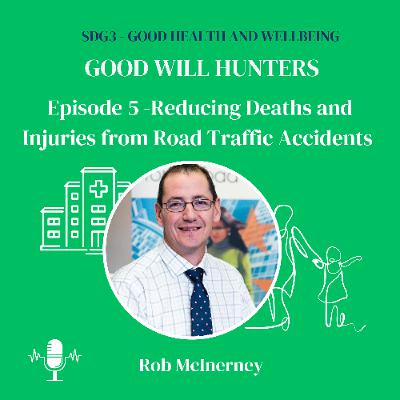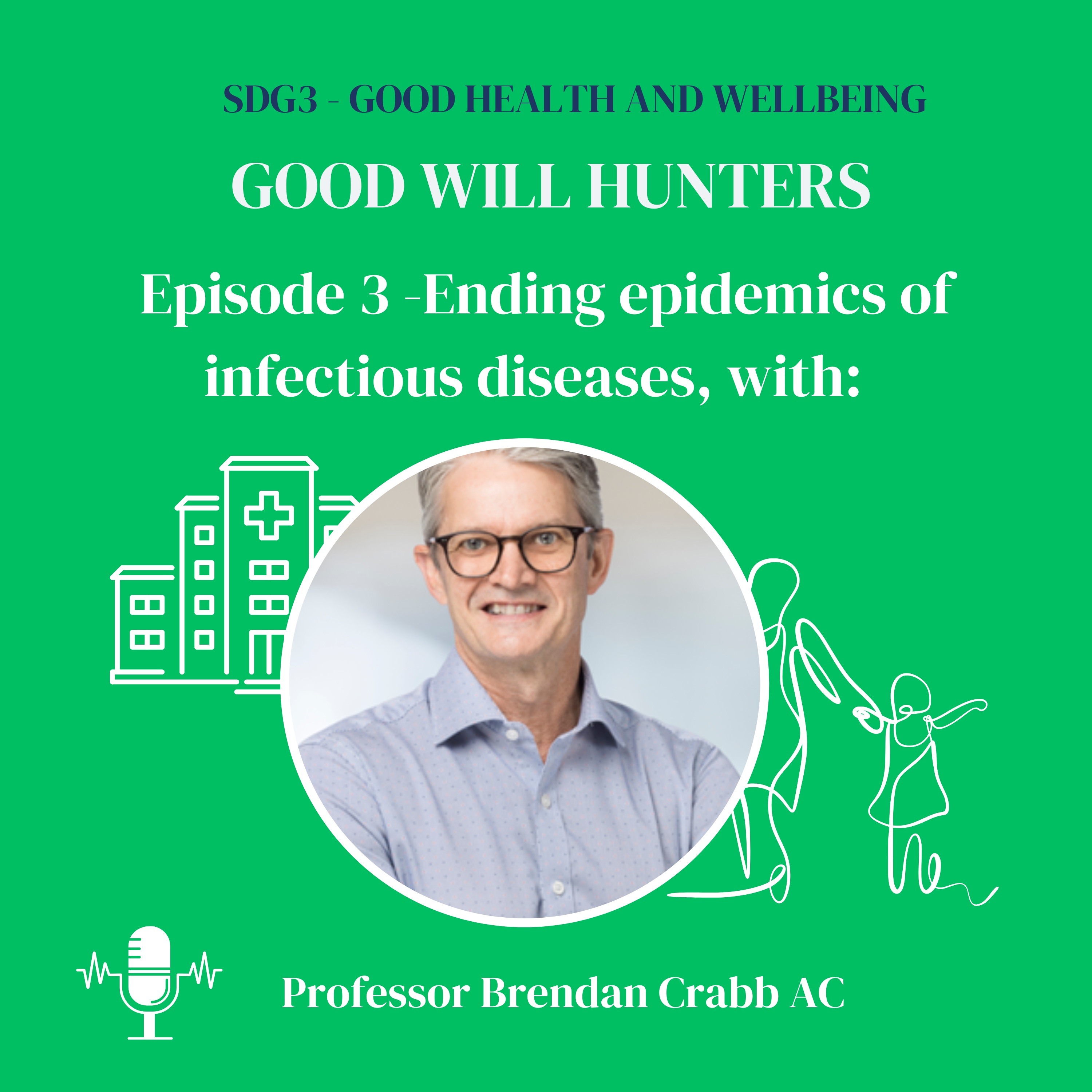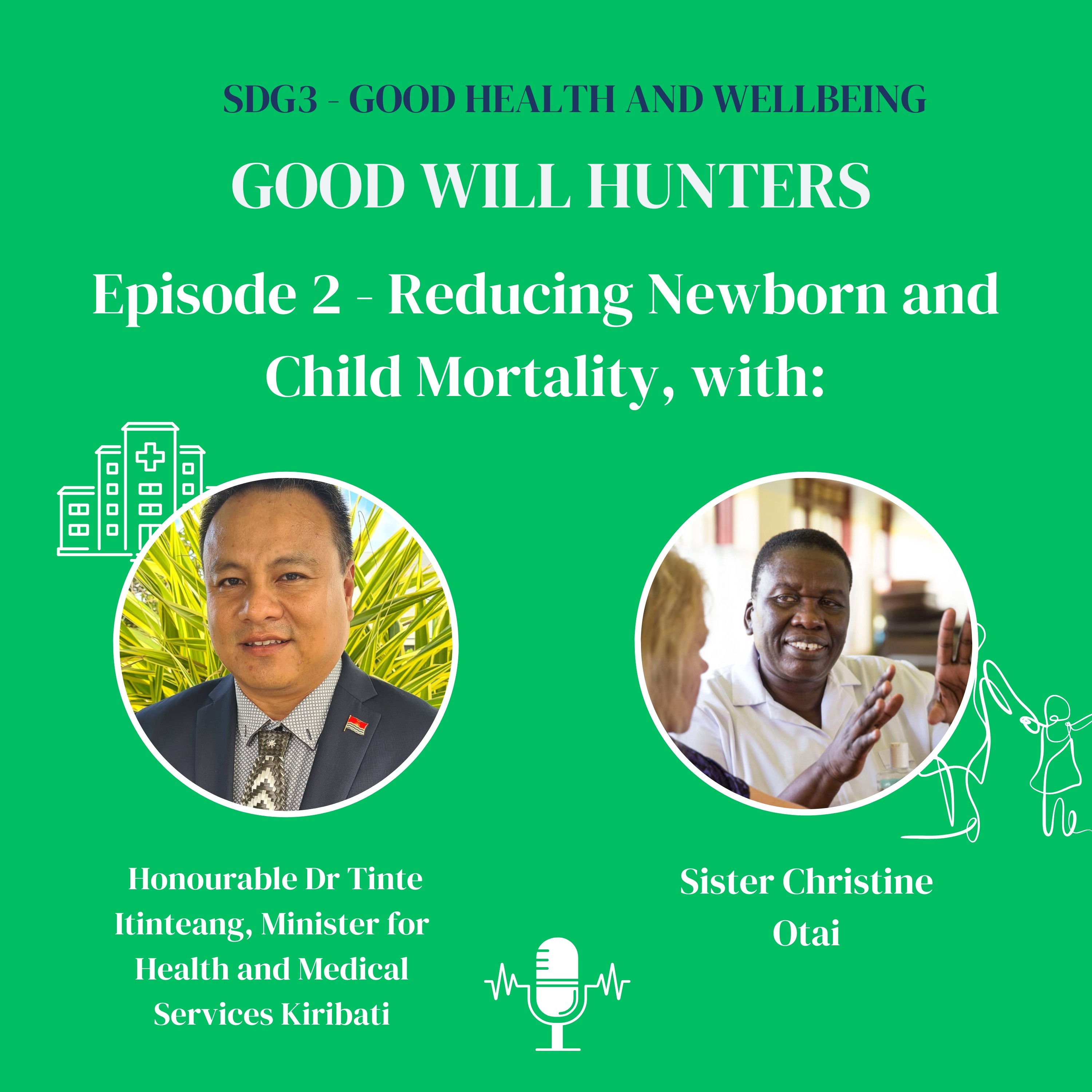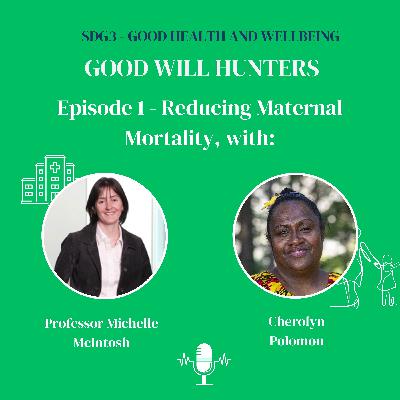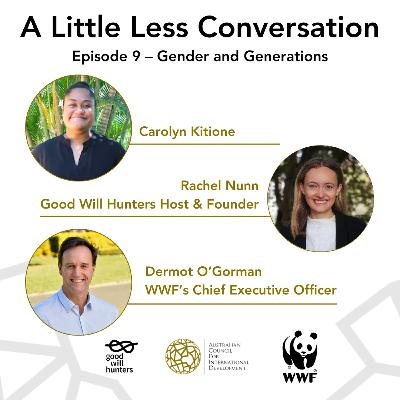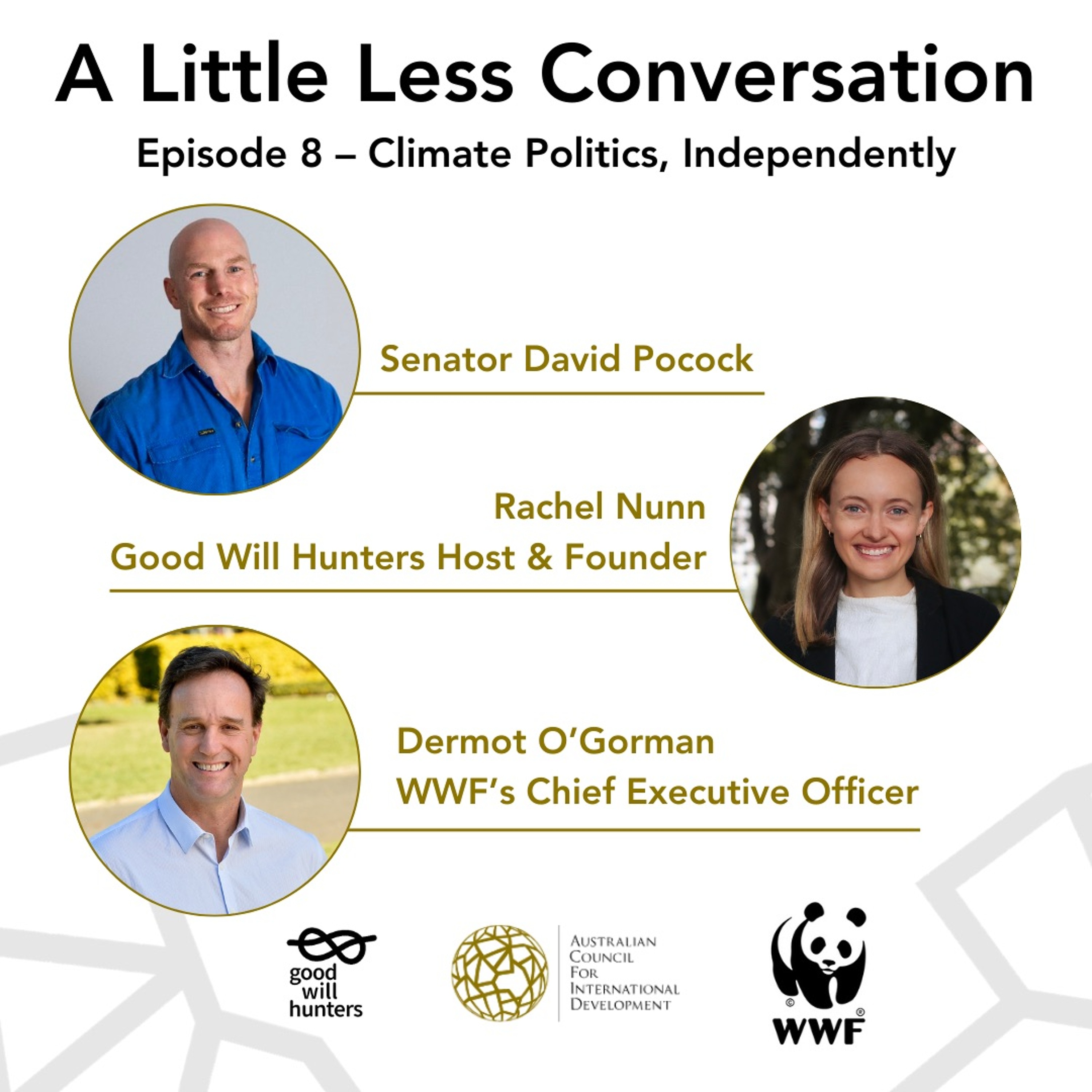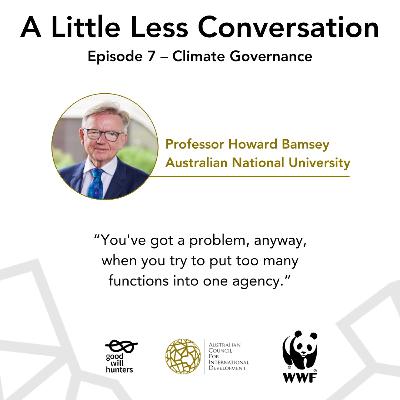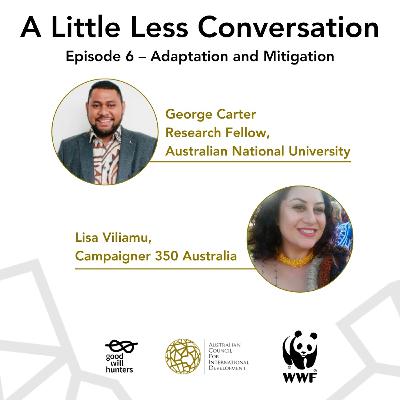Discover Good Will Hunters
Good Will Hunters

Good Will Hunters
Author: Good Will Hunters
Subscribed: 65Played: 2,858Subscribe
Share
© All rights reserved
Description
Join us as Rachel Mason Nunn explores the nuanced world of international development by talking to experts and game-changers whose voices and work are critical to radically transforming the sector and our communities for the better. Listen in and be prepared to hear from incredible people who push us to rethink international development, and how we can create meaningful and long-lasting change.
185 Episodes
Reverse
Success in the For-Purpose Sector with Kevin L Brown by Good Will Hunters
Welcome to this series of Good Will Hunters, co-hosted by Paul Ronalds, CEO of Save the Children Global Ventures, and me — Rachel Nunn, Founder of Good Will Hunters and Evoluta.
You’ll hear Paul and I introduce ourselves properly in just a moment.
Before we begin, I’d like to acknowledge the Traditional Custodians of the land on which I record these episodes — the Gadigal people of the Eora Nation — and pay my respects to Elders past, present and emerging.
In this fifth episode of the series, we look at technology and its uses in the for-purpose sector. And who better to talk to than David Spriggs, CEO of InfoXChange, an organisation focused on technology for social justice. Keen listeners will recall David has been on the show before. In this episode, we delve into the challenges and opportunities facing the for-purpose sector, across AI, data, and cybersecurity and we talk about the importance of investing in digital transformation. Enjoy the episode.
Welcome to this series of Good Will Hunters, co-hosted by Paul Ronalds, CEO of Save the Children Global Ventures, and me — Rachel Nunn, Founder of Good Will Hunters and Evoluta. You’ll hear Paul and I introduce ourselves properly in just a moment.
Before we begin, I’d like to acknowledge the Traditional Custodians of the land on which I record these episodes — the Gadigal people of the Eora Nation — and pay my respects to Elders past, present and emerging.
In this fourth episode of the series, we look at philanthropy. We have two industry leaders — John McLeod, co-founder of the JB Were Philanthropic Services team and one of Australia’s foremost experts on trends in giving, and Melissa Smith, founder of She Gives, a philanthropic platform redefining how women engage with giving. First up you’ll hear John, and then you’ll hear Melissa. We’ve also added a few links to the show notes so you can learn more about the work of both guests.
https://www.jbwere.com.au/campaigns/jbwere-nab-charitable-giving-index-
https://shegives.com.au/story/melissa-smith-on-the-power-of-stories-and-simple-acts/
Welcome to this series of Good Will Hunters, co-hosted by Paul Ronalds, CEO of Save the Children Global Ventures, and me — Rachel Nunn, Founder of Good Will Hunters and Evoluta. You’ll hear Paul and I introduce ourselves properly in just a moment.
I’d like to acknowledge the Traditional Custodians of the land on which I record these episodes — the Gadigal people of the Eora Nation — and pay my respects to Elders past, present and emerging.
In this third episode of the series, we’re joined by Grant McCabe, Managing Partner for Boston Consulting Group iN Australia and New Zealand, and President of the Geelong Cats Football Club. Paul, Grant and I talk about people - how to build and inspire great teams and what principles underpin effective leadership in the for-purpose sector
Jim Collins Leadership Theory: https://www.ft.com/content/fe2649df-fa54-4fe6-a925-f9e3a2559e27
Welcome to this new series of Good Will Hunters, co-hosted by Paul Ronalds, CEO of Save the Children Global Ventures, and me — Rachel Nunn, Founder of Good Will Hunters and Evoluta.
Before we begin, I’d like to acknowledge the Traditional Custodians of the land on which I record these episodes — the Gadigal people of the Eora Nation — and pay my respects to Elders past, present and emerging.
In this second episode of the series, we’re joined by the excellent Liv Whitty, CEO of Oho — a compliance automation and safeguarding platform designed for the care sector. Oho scans employee credentials continuously, helping organisations stay on top of Working With Children Checks, Police Checks, and other compliance measures — and closing the information and system gaps that bad actors can exploit.
But this is a conversation about business models in the for-purpose space. Oho ultimately chose a for-profit structure — but they could just as easily have gone down the not-for-profit route. In this episode, we unpack how that decision was made, and how you can approach the same question in your own work: What structure best supports your mission?
For Oho, the decision came down to the nature of the mission — preventing abuse by enabling mass adoption of a safeguarding tool. To reach the scale required, the team needed access to capital and fast product uptake, and a for-profit structure felt like the right path.
Welcome to this new series of Good Will Hunters, hosted by Paul Ronalds, CEO of Save the Children Global Ventures, and myself — Rachel Nunn, Founder of Good Will Hunters and Founder of Evoluta. You’ll hear Paul and I introduce ourselves again shortly, and share a bit about why we’ve chosen to do this short series on the for-purpose sector.
Before we get into the episode, I’d like to acknowledge the Traditional Custodians of the land on which I record these episodes — the Gadigal people of the Eora Nation — and pay my respects to Elders past, present and emerging.
In this first episode of the series, we’re joined by Dr Andrew Leigh, Assistant Minister for Productivity, Competition, Charities and Treasury.
Productivity is front and centre for this government — from boosting skills to mainstreaming artificial intelligence in the way we work. But what does a more productive charity sector look like? In this episode, we talk about the government’s role in supporting and sustaining the sector — and they’re a pretty important player, not least because 50% of the charity sector’s income comes from government.
We dive into the role of AI in boosting productivity, the government’s plan to double philanthropy by 2030, and why the voice of the charity sector is more important than ever.
I’d personally like to see a dedicated productivity agenda for the charitable sector — something I’m sure many of you might join me in pushing for.
Let’s get into it — and as always, I’d love to hear your thoughts.
Surprise! I’m back with a bonus episode of Good Will Hunters!
I’m thrilled to feature Lady Roslyn Morauta in this special wrap-up episode.
Lady Roslyn and I spoke yesterday, on December 18, covering some of the major themes from this series: health financing, the health workforce (including community health workers), the work of The Global Fund, Australia’s role in global health, and more. Most importantly, I asked her the big question: What should we do over the next five years? With little hope of achieving the SDG3 targets if we continue with business as usual, her insights are more critical than ever.
Lady Roslyn needs no introduction, but for context, she is the Chair of the Board of the Global Fund to Fight AIDS, Tuberculosis and Malaria, a role she assumed in May 2023.
She brings deep and multifaceted experience with the Global Fund, having served as Vice-Chair of the Board for four years, represented the Western Pacific Region constituency as Alternate Board Member, and chaired Papua New Guinea’s Country Coordinating Mechanism. She has been a steadfast advocate for health, HIV programs, and gender equity, with a strong understanding of the Global Fund’s strategies, processes, and grant implementation at the country level.
Lady Roslyn has lived and worked in Papua New Guinea since 1982 and served as the country’s First Lady from 1999 to 2002, during her husband Sir Mekere Morauta’s term as Prime Minister. In addition to her advocacy work, she has an impressive professional background, having worked in publishing in England, taught Politics at the University of Ghana, the Australian National University, and Queensland University, and held research roles with the Defence Department in Canberra and the Australian Social Welfare Commission.
Enjoy this special bonus episode, and I wish you all a very happy and safe festive season!
Welcome to Episode 8 of Good Will Hunters in our series on SDG3 – Good Health and Wellbeing. I am your host, Rachel Nunn.
This episode is the final in our series and focuses on SDG3.9 – Substantially reducing the number of deaths and illnesses caused by hazardous chemicals, air, water, and soil pollution and contamination. Poor air quality remains a significant health challenge, especially in low- and middle-income countries, where pollution disproportionately impacts vulnerable populations.
Today, I’m joined by three exceptional guests: Professor Lidia Morawska, a leading expert on air quality and its health impacts; Dr. Bronwyn King, a globally recognized radiation oncologist and tobacco-free investment advocate; and Anna-Maria Arabia, Chief Executive of the Australian Academy of Science:
Dr. Bronwyn King AO – Dr. King is a radiation oncologist and the founder and CEO of Tobacco Free Portfolios, recognized for her work in tobacco control and finance reform. She is also an Officer of the Order of Australia (AO) for her service to community health.
Distinguished Professor Lidia Morawska – Professor Morawska is internationally recognized for her work on air quality and its health impacts. She holds a distinguished professorship, which reflects her contributions to science and public health policy.
Anna-Maria Arabia – Anna-Maria is the Chief Executive of the Australian Academy of Science, known for her leadership in advocating for science and research in Australia and globally.
Together, we’ll explore the intersection of air quality, public health, and policy, discussing both the challenges and the innovations that can help us achieve cleaner air and healthier lives.
Indoor air quality gained significant attention during Covid-19, highlighting a critical gap in Australia’s health policies: we have no mandated standards for indoor air quality. Australians spend 90% of our time indoors, yet there are no regulations governing the quality of the air we breathe. Other countries are doing better in this regard, but many are also doing much worse.
As we close this series, I want to thank you for joining me on this exploration of SDG3. Australia's role as a major health donor to the region is crucial, and we need a cohesive plan to measure and report on our contributions to these targets. Strengthening health systems will require sustained investment in the health workforce, culturally sensitive care, road safety, and leveraging our incredible domestic R&D capabilities. And above all, we can’t manage what we don’t measure – tracking our progress is essential if we are to make real strides toward achieving good health and wellbeing for all.
It’s been a privilege to host this series, and I hope it’s inspired you to think about the work that lies ahead and how we can collectively drive progress. Thank you for listening, and I hope you enjoy today’s episode.
Today’s episode is on SDG3.8 - Achieve Universal Health Coverage. Universal Health Coverage means ensuring everyone, everywhere, has access to quality essential health care services, medicines and vaccines. It also means ensuring that health expenditure isn’t a large proportion of total household expenditure. Universal Health Coverage encompasses all of the other targets under SDG3. It’s essential - and it’s also a bit of a utopia, if you look at the current state of many health systems around the world.
Today’s guest is Australia’s Ambassador for Global Health, Dr Lucas De Toca PSM. Dr de Toca is a medical doctor, adjunct professor in medicine, and public health expert with extensive experience in pandemic response, First Nations health and rural health service delivery. He leads the Global Health Division and the Indo-Pacific Centre for Health Security at the Department of Foreign Affairs and Trade, managing Australia’s relationship with multilateral health organisations and our international development assistance in health.
Today we look at Universal Health Coverage and why it’s so hard to attain. We speak about how stretched the health workforce is in the Indo-Pacific region, and why Australia has shifted to a greater investment in primary health care since Covid-19. We speak about why financing health is so difficult for so many countries, and how Australia can leverage our immense domestic health expertise to better support the region. And - Lucas tells us why he thinks he has the best job in the world.
Since recording this episode, Lucas has made a number of exciting announcements, including Australia’s new Pacific Climate and Health Resilience Package announced during Cop29, and our new partnership with the World Mosquito Program to support the control of mosquito borne disease in Timor-Leste, Kiribati and Indonesia. Additionally, and very excitingly, Lucas announced $56.8m is going to achieving universal sexual and reproductive health and rights in the Indo-Pacific, to improve access to sexual and replicative health services in Southeast Asia.
Welcome to Episode 6 of Good Will Hunters, in our new series on SDG3 - Good Health and Wellbeing. Today’s episode looks at SDG 3.7 - By 2030, ensure universal access to sexual and reproductive health-care services, including for family planning, information and education, and the integration of reproductive health into national strategies and programmes. Specifically, we’ll be focusing on a new program which I am incredibly excited about - it is the Elimination Partnership in the Indo-Pacific for Cervical Cancer, or EPICC.
https://www.sydney.edu.au/news-opinion/news/2023/11/22/australia-takes-epicc-step-to-cervical-cancer-elimination.html
EPICC is a regional health initiative designed to support countries across the Indo-Pacific region accelerate their journey towards the elimination of cervical cancer, and progress towards achieving the WHO 90/70/90 cervical cancer elimination strategy targets:
https://www.who.int/initiatives/cervical-cancer-elimination-initiative
Welcome to Episode 5 of Good Will Hunters, in our new series on SDG 3 - Good Health and Wellbeing.
Now firstly - I have to apologise. I promised you an episode on each of the SD3 targets, however we are skipping SDG3.5 on substance abuse. We just couldn’t find a great guest for the episode and the show must go on. However, I am very open to doing the episode at a later date, so if you work in substance abuse internationally, particularly in the Pacific, and would like to chat, get in touch.
With that, today we move onto SDG3.6 - which it may surprise you to learn, relates to road accidents. I am speaking to Rob McInerney. Rob is Chief Executive Officer for the International Road Assessment Programme (iRAP), a registered charity with the vision for a world free of high-risk roads.
With RAP projects and programmes now active in over 100 countries worldwide, Rob works closely with key development bank, political and technical leaders from each country to build local capacity and deliver large scale and long-term road safety benefits through the provision of safer road infrastructure. Of all our episodes this series, this one surprised me the most. I’ll leave you to find out why. Enjoy!
Welcome to Episode 4 of Good Will Hunters, in our new series on SDG 3 - Good Health and Wellbeing.
So far in the series, we’ve looked at maternal and child health and infectious diseases. The response to the series has been enormous - last week I appeared on Radio New Zealand talking about the unacceptably high rates of child mortality in Kiribati. This series was designed to raise attention to the fact that we are not on track to meeting SDG3, and we must take urgent action.
Today I am talking to Dr Rosemary Wyber about SDG 3.4, which relates to non-communicable diseases. Non-comunicable diseases, also known as chronic diseases, are not passed from person to person. This includes heart diseases, stroke, cancer, diabetes, and chronic lung disease. For those that follow me on LinkedIn, you would know I have spent a part of this year working in Timor-Leste on strengthening the local cardiology workforce, in response too extremely high rates of rheumatic heart disease. Hence, I wanted to focus today’s episode on heart disease, and who better to speak to than Dr Rosemary Wyber.
Rosemary is a General Practitioner, and also holds a Masters of Public Health from the Harvard School of Public Health general practice training in Aboriginal Community Controlled Clinics in the Northern Territory of Australia.
Dr Wyber’s doctoral research focused on rheumatic heart disease in Australia and internationally. She was the lead author of the RHD Endgame Strategy to eliminate RHD in Australia. Her postdoctoral research continues to address RHD and broader heart health for Aboriginal and Torres Strait Islander people. In this episode, we talk about what rheumatic heart disease is, how it is managed, and how health systems can better address it.
Welcome to Episode 3 of Good Will Hunters, in our new series on SDG 3 - Good Health and Wellbeing.
In our previous episode, we looked at infant and child mortality in Kiribati. The wonderful folks at the Devpolicy Blog published an article on the episode if you’d like to check it out.
If you’ve listened to our first two episodes, you’ve probably seen a theme beginning to emerge. We are, in no way, shape or form, on track to achieving SDG3.
We are falling behind on all targets, and many of our neighbours in the Indo-Pacific region are feeling it most. We should be concerned. But we should also be encouraged by the immense capability that exists, both in Australia and amongst our neighbours, to solve many of the public health challenges we face.
Today’s guest is a great example of someone with extraordinary vision and capability. In this episode, I speak to Professor Brendan Crabb, Director and CEO of the Burnet Institute, about SDG3.3, on ending epidemics of infectious diseases.
In this episode we talk about malaria, tuberculosis, HIV, neglected tropical diseases AND covid-19. We also talk about Australia’s support for the region and leveraging our immense resources in health research and development. As well as being Director and CEO of Burnet, Brendan is President of both the Australian Global Health Alliance and the Pacific Friends of Global Health, bodies that advocate for better health equity.
Welcome to Episode 2 of our SDG3 series.
In this series, we’ll be going through each of the targets of SDG3. In our previous episode, we looked at maternal mortality, and specifically some exciting work happening right here in Australia to developed inhaled oxytocin, to help prevent postpartum hemorraghe, which is one of the leading causes of maternal death. We also heard about the importance of connectivity and support networks for nurses and health workers in remote areas, dealing with often complex pregnancies and births.
Today we move onto SDG3.2, which is ‘by 2030, end preventable deaths of newborns and children under 5 years of age, with all countries aiming to reduce neonatal mortality to at least as low as 12 per 1,000 live births and under-5 mortality to at least as low as 25 per 1,000 live births'.
Today’s episode is very special - you’ll be hearing from the Kiribati’s Honourable Minister for Health and Medical Services, Dr Tinte Itinteang, along with members of his team and partners. Kiribati has one of the highest rates of Under 5 Mortality in the Pacific, second to Papua New Guinea. Despite decades of programs and partnerships, the dial has not shifted enough.
The Honourable Minister and his team are embarking upon a new program - it is the Child Community Nursing Outreach Program or CCNOP. It’s a first of its kind program in Kiribati - and that’s all I’m going to tell you. You’ll have to listen to hear more. You’ll hear lots of different people speaking in this interview, I have listed all of their names in the show notes. This interview left me both saddened by the unacceptably high rates of child and infant mortality in Kiribati, but also extremely buoyed by the skill, passion and vision of the team who I had the honour of speaking to.
The first voice you’ll hear is that of the Honourable Minister - I hope you enjoy.
Following the Honourable Minister, you will hear from Sister Christine Otai. Christine is Adara’s Senior Newborn Advisor, based in Uganda. She contributes to the improvement of newborn health in Uganda through training, mentoring and coaching.
Christine worked at Kiwoko Hospital for 28 years. For nine of these years, she worked as In-Charge of the Kiwoko Hospital maternity ward. For 18 years she worked as In-Charge of the Kiwoko neonatal intensive care unit (NICU).
In 2010, Christine was honoured with the International Neonatal Award for Excellence. In 2021, she received a Lifetime Achievement Award from the Heroes in Health Awards. She has also been recognised as a newborn health champion by the Ugandan Ministry of Health.
SDG3.1 - Reducing Maternal Mortality, with Prof. Michelle McIntosh and Cherolyn Polomon by Good Will Hunters
This 10th and final episode of A little Less Conversation is one that is both reflective and future facing. If you’re looking to know more about the outcomes achieved at COP28, the architecture of the loss and damage fund and Australia’s climate finance ambitions and commitments more generally, you’ve come to the right place.
Jess Mackenzie chats with David Higgins, the branch head of international net zero pathways, within the Department of Climate Change, Energy, the Environment and Water (DCCEEW).
Department of Climate Change, Energy, the Environment and Water - Home - DCCEEW
Department of Foreign Affairs - Homepage | Australian Government Department of Foreign Affairs and Trade (dfat.gov.au)
Transitional Committee, UNFCCC - Transitional Committee | UNFCCC
World bank - World Bank Group - International Development, Poverty, & Sustainability
COP28 - COP28 UAE - United Nations Climate Change Conference
UNFCCC - UNFCCC
The Pacific Resilience Facility - PRF-Brochure.pdf (forumsec.org)
International Monetary Fund - International Monetary Fund - IMF
AOSIS: Alliance of Small island States - AOSIS – Alliance of Small Island States
South Pacific Regional Environment Program (SPREP) - Home | Pacific Environment (sprep.org)
Green Climate Fund (GCF) - Homepage | Green Climate Fund
International Development Association (IDA) - International Development Association - World Bank
The Pacific island Forum (PIF) - The Pacific Islands Forum – Pacific Islands Forum (forumsec.org)
Climate change is impacting society in a myriad of ways, yet some groups are experiencing these impacts disproportionately. In this episode we take a deep dive into gender, youth and elders in the Pacific; How are they experiencing climate change? What are their priorities? and What does effective climate leadership look like?
In this episode, we are joined by Carolyn Kitione, a youth leader and learning coordinator with Shifting the Power Coalition.
Shifting the Power Coalition - Shifting the Power Coalition - ActionAid Australia
Transcend Oceania - Transcend Oceania – There is no other way to peace Justpeace is the way
Action Aid Vanuatu - ActionAid Vanuatu - ActionAid Australia
Australia Pacific Climate Partnership - Pacific regional – climate change and resilience | Australian Government Department of Foreign Affairs and Trade (dfat.gov.au)
Pacific Conference of Churches - Home - Pacific Conference of Churches
In a short time in the federal Parliament, Senator David Pocock has made a name for himself as someone willing to speak out on the big issues on behalf of the people most affected. These include taking on the Government over fossil fuels, climate change and other issues including cost of living.
In this episode of A Little Less Conversation, Rachel and Dermot chat to Senator Pocock about his advocacy on climate change and his profound commitment to the Pacific, how his experiences through professional sport helped shape his worldview, and his own NGO, Rangelands Regeneration.
https://www.davidpocock.com.au/
Rangelands Regeneration https://rangelandsregeneration.org/
Young people Duty of Care bill https://adutyofcare.davidpocock.com.au/
Australia Institute speech https://australiainstitute.org.au/post/australia-must-lead-the-world-on-climate-integrity-senator-david-pocock/
Port vila call https://fossilfueltreaty.org/port-vila-call
Climate change could be a political football, easily booted from agency to agency, if there was no true will to progress the agenda. It is true that climate falls under the remit of a number of government agencies – but thankfully, there is the will to ensure it is divided up carefully and with thought. Howard Bamsey, who has spent much of his career as a diplomat and in climate change, joins the podcast to tell Rachel and Dermot all about the architecture of climate governance.
Adaptation and mitigation are two terms commonly used in connection with how to approach responses to climate change: do we spend our energies trying to address the root causes of climate change, or do we work on strategies to help us adapt?
In this episode, Sala George Carter of the Australian National University and climate change activist Lisa Viliamu Jameson join us to discuss the twin approaches.
Torres Strait Islands Our Islands Our Home campaign: https://ourislandsourhome.com.au
Secretariat of the Pacific Regional Environmental Program https://www.sprep.org
CROP program - Council of Regional Organisations of the Pacific https://www.forumsec.org/council-of-regional-organisations-of-the-pacific
Port Vila Declaration on human rights, good governance and sustainable development: https://hrsd.spc.int/node/821
Comments
 United States
United States

